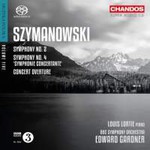
Szymanowski: Symphonies Nos. 2 & 4 / Concert Overture
 $40.00
Out of Stock
$40.00
Out of Stock6+ weeks add to cart
KAROL SZYMANOWSKI
Szymanowski: Symphonies Nos. 2 & 4 / Concert Overture
BBC Symphony Orchestra, Edward Gardner, with Louis Lortie, piano
[ Chandos SACD / Hybrid SACD ]
Release Date: Tuesday 1 January 2013
This item is currently out of stock. It may take 6 or more weeks to obtain from when you place your order as this is a specialist product.
This recording of orchestral works by Karol Szymanowski form part of the Polish Music series on Chandos, and is performed by the BBC Symphony Orchestra and Edward Gardner. These performers have impressed in their Lutosławski survey, which is part of the same series; in a review of volume 1, Gramophone described them as a veritable 'dream team'.
Symphony No. 2 by Szymanowski is a work of great power and ingenuity, with many passionate and varied contrasts in its use of solo instruments. Composed in 1909 - 10, it is widely considered the greatest orchestral work of the composer's early period, not to mention one of the most important Polish symphonic compositions to date. Szymanowski himself thought very highly of it, and in August 1911 wrote in a letter to his fellow Polish composer Zdzisław Jachimecki: 'How happy I am that this Symphony impressed you as I had wanted. I will frankly admit that I feel somewhat proud about its value. In some miraculous way I have managed during my work on it to resist all those garish phantoms which seduce "young and inexperienced" artists and to produce pure and uncompromising beauty in the way I personally understand it.'
The internationally acclaimed pianist Louis Lortie joins the orchestra and conductor in Symphony No. 4 of 1932, which the composer subtitled 'Symphonie concertante' in recognition of the near-soloistic role played by the pianist. Whereas Szymanowski's early and middle works clearly reflect Wagner, Strauss, and Scriabin, this work is strongly influenced by Prokofiev, particularly in the finale, an agitated and daring movement reminiscent of the Russian composer's Piano Concerto No. 3, composed about a decade earlier.
Written in 1904 - 05 in a style recalling Wagner and Strauss, the Concert Overture is characterised by enormous expressiveness and gusto in the way it handles the expanding themes. Szymanowski inscribed the original score with part of the poem Witeź Włast by his friend Tadeusz Miciński: 'I will not play you sad songs, O Shades! but will give you a triumph proud and fierce…'. This vivid imagery is perfectly in keepin
"Gardner makes a stronger case for the Polish composer, clarifying textures and tautening musical lines" (Financial Times)
"These performances prove ideal, finding luminosity at the opening, and delivering a taut, energetic fugal finale...In the oberek dance rhythms of the orgiastic finale, Gardner shows how he has become one of the finest non-Polish interpreters of Szymanowski." (Five Stars) BBC Music Magazine Awards 2014 Orchestral Finalist
"The whole Szymanowski landscape is here...though a single sitting might prove indigestible and is probably not advised, the changing face and manner of this most fascinating and accomplished of composers is richly chronicled here in characterically impressive Chandos sound."
Edit's Choice Gramophone Magazine - March 2013
"[Gardner's] gloriously broad and sweeping account of a work that reflects Szymanowski's seemingly boundless admiration for Richard Strauss's symphonic poems sets the tone for a disc that emphasises the composer's late romantic affiliations rather than his modernist ones, especially with the BBC Symphony Orchestra on opulent form"
(Guardian)
This recording of orchestral works by Karol Szymanowski form part of the Polish Music series on Chandos, and is performed by the BBC Symphony Orchestra and Edward Gardner. These performers have impressed in their Lutosławski survey, which is part of the same series; in a review of volume 1, Gramophone described them as a veritable 'dream team'.
Symphony No. 2 by Szymanowski is a work of great power and ingenuity, with many passionate and varied contrasts in its use of solo instruments. Composed in 1909 - 10, it is widely considered the greatest orchestral work of the composer's early period, not to mention one of the most important Polish symphonic compositions to date. Szymanowski himself thought very highly of it, and in August 1911 wrote in a letter to his fellow Polish composer Zdzisław Jachimecki: 'How happy I am that this Symphony impressed you as I had wanted. I will frankly admit that I feel somewhat proud about its value. In some miraculous way I have managed during my work on it to resist all those garish phantoms which seduce "young and inexperienced" artists and to produce pure and uncompromising beauty in the way I personally understand it.'
The internationally acclaimed pianist Louis Lortie joins the orchestra and conductor in Symphony No. 4 of 1932, which the composer subtitled 'Symphonie concertante' in recognition of the near-soloistic role played by the pianist. Whereas Szymanowski's early and middle works clearly reflect Wagner, Strauss, and Scriabin, this work is strongly influenced by Prokofiev, particularly in the finale, an agitated and daring movement reminiscent of the Russian composer's Piano Concerto No. 3, composed about a decade earlier.
Written in 1904 - 05 in a style recalling Wagner and Strauss, the Concert Overture is characterised by enormous expressiveness and gusto in the way it handles the expanding themes. Szymanowski inscribed the original score with part of the poem Witeź Włast by his friend Tadeusz Miciński: 'I will not play you sad songs, O Shades! but will give you a triumph proud and fierce…'. This vivid imagery is perfectly in keeping with the music's exuberant and vivacious character.
Tracks:
Concert Overture, Op.12
Symphony No. 2 in B flat major, Op. 19
Symphony No. 4, Op. 60 (Sinfonia Concertante)
(with Louis Lortie, piano)
